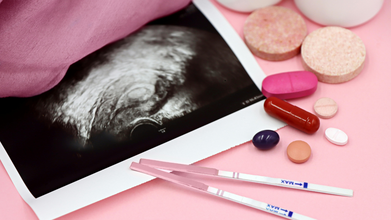- Health Conditions A-Z
- Health & Wellness
- Nutrition
- Fitness
- Health News
- Ayurveda
- Videos
- Medicine A-Z
- Parenting
Are Breastfeeding Mothers More Prone to Depression? Here is What Experts Say

Credits: Unsplash
Breastfeeding rates are similar around the world, however, there are certain barriers breastfeeding mothers face. These challenges differ in developed and developing countries. Dr Avneet Kaur, neonatologist and Pediatrician at the Apollo Cradle Hospital, says that in developed worlds, perceived inconvenience of breastfeeding and ease of bottle feeding, false idea of healthiness in chubby babies, lack of family support and lack of breastfeeding-friendly work environment played a significant role in poor breastfeeding rate.
On the other hand, in the developing world, due to lack of education and poor access to healthcare facilities, “false beliefs regarding breastfeeding being roadblocks to success” is what led to the discouragement of breastfeeding, points out Dr Kaur.
Benefits of Breastfeeding
Dr Kaur points out that both the mother and the child benefit from breastfeeding. “Breastfeeding is associated with decreased rates of lower respiratory tract infections, severe diarrhoea, otitis media, sudden infant death syndrome and obesity in babies,” she says.If there is a lack of breastfeeding, it may lead to health problems for the baby. Some babies may develop medical conditions like postnatal weight loss, dehydration, and fever. “Mother faces issues like mental stress, breast engorgement and delayed emotional bonding,” says Dr Kaur.
Breastfeeding also benefits premature or preterm babies. “Premature babies who are formula fed and do not receive breastmilk are more likely to get a life-threatening bowel condition called necrotising enterocolitis or NEC,” says Dr Kaur.
She suggests that breastfeeding and human milk feeding support optimal growth, improve immune function and neurodevelopment, and prevent bowel and septic complications, including necrotizing enterocolitis in preterm babies.
However, breastfeeding is still not easy for many mothers. Many workplaces still lack provisions for maternity leave, not allowing enough rest for the mother to look after her child. Other factors could be the lack of private space to feed the child and the lack of social, emotional and familial support. This can make the mother prone to depression.
Are Breastfeeding Mothers Depressed?
Right after a child is born, a mother may feel anxious and exhausted, this is called post-partum depression. “It is quite common for breastfeeding mothers to experience depression. Studies suggest that approximately 10-20% of new mothers experience postpartum depression,” says Dr Chandril Chugh, senior consultant neurologist and director of Good Deed Clinics.Dr Chugh mentions the reason for a breastfeeding mother to feel depressed is the lack of support that she receives from her family. “Social support is crucial. Emotional support from partners, family, and friends can help alleviate feelings of isolation and stress. Support groups and professional counselling can also provide necessary emotional backing and practical advice,” he says.
Added Responsibilities
Dr Kaur suggests that breastfeeding must be done as soon as the mother is stable after the delivery. However, without the support of family, a mother may feel that she is doing everything alone.Especially at home, a baby may be required to be breastfed at night, which can disrupt a mother’s sleep cycle, pushing her more towards depression. “Sleep deprivation and chronic fatigue are significant risk factors for depression. The demands of breastfeeding, especially frequent night feedings, can disrupt sleep patterns and contribute to emotional and physical exhaustion,” says Dr Chugh.
However, Dr Chugh also notes that if the mother is given the support that she requires, and the responsibility is shared, then the mother can enjoy the benefits that breastfeeding. “Prolactin and oxytocin levels increase during breastfeeding, which can also influence mood and emotional well-being,” he says.
Taking care of the mother is of utmost importance right after delivery, especially when she is breastfeeding. He suggests that adequate rest and helping the mother with the baby must be the top priority. A mother must not feel alone, and she should be given the support she needs to ensure that she also benefits from breastfeeding.
“Mother should start taking good diet and remain hydrated, get optimum sleep and rest in first 4 weeks to recover in the postpartum period. Stress and inadequate sleep are major hindrances to breastmilk production,” says Dr Kaur.
Leaving mothers alone with her babies discourages the purpose of the breastfeeding awareness week and pushes the mother further into depression.
Cold Weather And Low Fertility; Is There A Link? Explains Doctor

Credits: Canva
As winter sets in, conversations around health often shift to immunity, joint pain, and seasonal illnesses. But can colder weather also influence fertility? According to experts, cold weather does not directly cause infertility, but it can quietly affect hormones and reproductive health through lifestyle and biological changes.
Dr Geeta Jain, HOD of Obstetrics, Gynecology and IVF, and Co-founder of Maccure Hospital and Aastha Hospital, explains that fertility is rarely impacted by temperature alone. “Cold weather does not directly cause infertility, but it can have an indirect impact on fertility and hormonal balance,” she says.
How Seasonal Changes Affect Hormones
One of the most significant winter-related changes is reduced exposure to sunlight. Shorter days and limited sun can influence the body’s hormonal rhythm, particularly melatonin and vitamin D levels. These hormones are closely linked to reproductive hormones such as estrogen, progesterone, and testosterone.
“Lower sunlight levels can affect the secretion of melatonin and vitamin D, both of which play an important role in reproductive health,” Dr Jain explains. Vitamin D deficiency, which is more common during winter months, has been associated with irregular menstrual cycles, ovulatory issues, and conditions like polycystic ovary syndrome (PCOS). All of these factors can make conception more challenging.
Menstrual Changes During Winter
Some women notice changes in their menstrual cycles during colder months, including delayed periods, increased cramps, or irregular ovulation. However, temperature is not the main culprit.
“These changes are often linked to lifestyle factors rather than cold weather itself,” says Dr Jain. Reduced physical activity, weight gain, changes in diet, and increased consumption of high-calorie comfort foods during winter can disrupt insulin sensitivity and hormonal balance. Over time, this may indirectly affect ovulation and fertility.
Stress, Mood, and Fertility
Mental health also plays a critical role in reproductive health, especially during winter. Shorter days and less outdoor activity can contribute to seasonal mood changes, anxiety, or even depression. These emotional shifts can elevate cortisol, the body’s stress hormone.
“Elevated cortisol can interfere with the normal functioning of reproductive hormones,” Dr Jain notes. If stress becomes chronic, it may affect ovulation and fertility over time, even in otherwise healthy individuals.
Does Cold Weather Permanently Affect Fertility?
The good news is that winter-related hormonal changes are usually temporary. “Cold weather does not permanently harm fertility,” Dr Jain reassures. Most seasonal shifts can be reversed by adopting healthy habits.
Maintaining a balanced, nutrient-rich diet, staying physically active indoors or outdoors, managing stress, getting adequate sleep, and ensuring sufficient vitamin D intake can help support hormonal balance throughout the colder months.
Why Testing For Thyroid Matters Before Planning A Pregnancy, Explains Doctor

Credits: iStock
When couples plan a pregnancy, conversations usually revolve around ovulation, sperm count, and the health of the uterus. What often goes unnoticed is a small butterfly-shaped gland in the neck that quietly influences all of this: the thyroid. According to Dr Swati Rai, Consultant Gynecologist and Laparoscopic Surgeon at Motherhood Hospitals, Noida, checking thyroid health before trying to conceive is not optional. It is essential.
Why thyroid testing matters before pregnancy
The thyroid controls many vital processes in the body, including metabolism, energy levels, and hormone balance. Even a mild thyroid imbalance can interfere with fertility, yet many couples are unaware of this connection. Dr Rai explains that untreated thyroid problems can make it harder to conceive and may also affect the ability to sustain a pregnancy. This is why both partners, especially women, should undergo thyroid testing before planning a baby.
In many cases, couples spend months focusing on reproductive organs while the real issue lies elsewhere. A poorly functioning thyroid can quietly disrupt the body’s reproductive rhythm without obvious warning signs.
The thyroid and menstrual health
Thyroid hormones play a key role in regulating menstrual cycles and ovulation. When thyroid levels are low, a condition known as hypothyroidism, periods may become irregular or infrequent. Ovulation can be delayed, and eggs may not mature properly. On the other hand, hyperthyroidism, where hormone levels are too high, can cause unpredictable cycles, making it difficult to time conception.
These disruptions often lead to confusion and frustration, especially when routine fertility tests appear normal. As Dr Rai points out, thyroid imbalance is frequently the missing link in unexplained fertility issues.
How thyroid health affects the womb
The thyroid does not just influence ovulation. It also affects the womb itself. Healthy thyroid hormone levels support the growth of a thick, healthy uterine lining that is needed for implantation. If hormone levels are slightly off, the lining may not be able to support a fertilized egg, increasing the risk of early miscarriage.
Thyroid imbalance can also reduce progesterone levels after ovulation. Progesterone is crucial for sustaining pregnancy, and low levels may lead to difficulty maintaining it even after conception. Additionally, some women have thyroid antibodies despite having normal hormone levels. These antibodies can cause inflammation that interferes with implantation and early pregnancy development.
Symptoms that are easy to miss
Many women experience fatigue, unexplained weight gain or loss, hair fall, or mood changes but do not associate these symptoms with fertility problems. Factors such as stress, poor diet, iodine deficiency, and low iron levels can further disrupt thyroid function. Without testing, these issues often go undetected.
Taking the right steps early
Dr Rai advises women to undergo a complete thyroid evaluation before pregnancy, not just a basic TSH test. Early detection and treatment can significantly improve fertility outcomes and support a healthier pregnancy.
She also recommends following a balanced diet rich in iodine, iron, selenium, and protein, managing stress through yoga or meditation, and reporting symptoms like irregular periods or persistent fatigue to a doctor without delay. If pregnancy does not occur despite normal reports, seeking medical advice early is crucial.
Prioritizing thyroid health is a simple but powerful step. Addressing it in time can make the journey to pregnancy smoother, safer, and far less stressful for couples hoping to conceive.
Danish Parenting Rule Book: Children Always Make Sense

Credits: iStock
Too much about Danish parenting is already out in the discussion, but there is something new, yet again. The rulebook to Danish parent, and its first rule is: Children Always Make Sense.
The New Danish Parenting or NDP is based on a concept which relies on the Internal Family System or IFS, an attachment theory that in Denmark is called the New Child View. This is a shift from the old ways of parenting, to a new method, which follows equality, integrity, authenticity, and accountability.
The new child view is based on the work of Danish Family Therapist Jesper Juul, Family-lab, and Blackbird Institute.
Danish Parenting: Why Is It Important?
The Old paradigm of parenting was based on fear, control, abuse of power and inequality between the parent and child. Even though parents know how children behave, the old way is ingrained into our brains so much, that it is hard to follow through in practice. The new method thus compels parents to be with their own wounded parts or the inner child. This is when it becomes even more important to be with the actual child the parent is taking care of.
Also Read: What Is Denmark's 'Cry It Out' Method Of Putting Babies to Sleep?
Danish Parenting: Why Is It Unique?
At the foundation of New Danish Parenting is attachment. It is through the attachment of oneself from within can one take care of the actual child. The new way encourages to form a sense of safety, security and attachment between the self and parts of our inner children.
The system this bases focuses on healing modality. The focus lies on feeling safe, being the parent our child wants us to be. The new method has this New Danish Parenting, the first rule is: Children Always Make Sense. Let's talk a bit about that before moving on to the other rules.
Danish Parenting Rule No. 1: Children Always Make Sense
As human beings, we live on a spectrum between integrity and cooperation. Integrity means being true to what we feel on the inside and expressing it honestly on the outside. Cooperation, on the other hand, is about fitting in, belonging, and maintaining relationships with caregivers, family, and society. Both are essential for healthy living, but the balance between them can easily tip.
We are born deeply connected to our integrity. As babies, we cry when we are hungry, uncomfortable, or scared. We turn toward connection when we need it and turn away when we’ve had enough. This isn’t weakness. It’s competence. Babies instinctively know how to communicate their needs and boundaries.
The bond between a baby and caregiver is a two-way relationship. When a baby makes a sound or facial expression and a caregiver responds with a similar one, both are engaging, learning, and growing. These small moments shape the brain and nervous system of both child and adult, building connection and trust.
As we grow, we naturally adapt to our environment. This helps us survive, belong, and feel loved. We learn to share, wait, cooperate, and consider others. In supportive environments, children learn how to be themselves while staying connected to others.
But no environment is perfect. This is where over-cooperation begins. Over-cooperation happens when children learn that certain feelings, needs, or boundaries are not acceptable. A child may hide sadness behind a smile, ignore discomfort during unwanted touch, or eat past fullness because stopping isn’t allowed.
What often looks like “bad behavior” is actually a child struggling. Children are not being difficult; they are having a difficult time. Their behavior always has meaning and usually comes from a place of self-protection.
When adults meet children with curiosity instead of punishment, children feel seen and safe. This helps them understand themselves better and slowly return to a healthier balance between integrity and cooperation.
© 2024 Bennett, Coleman & Company Limited

